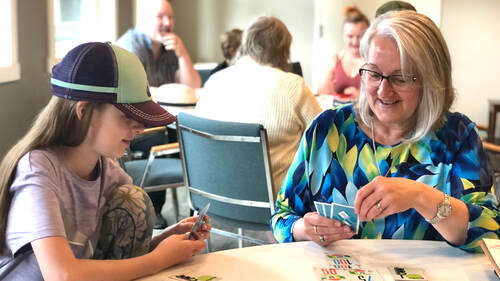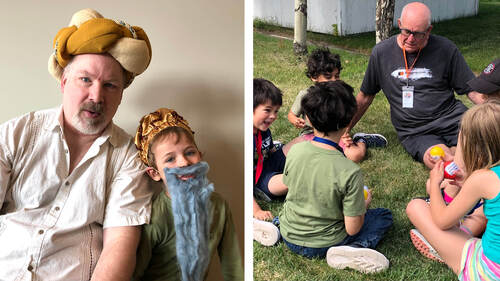From One Generation to the Next

A couple of rustic cabins carved into a clearing in the woods at a nearby lake provided the setting for significant times of spiritual awakening and growth in faith. Weekend retreats hosted several times each year by our youth group were packed with adventures appropriate to the season. They were the platform on which rich memories were created that I continue to treasure.
Every retreat also included several sessions of worship around the campfire and the teaching of Scripture. Leaders from the congregation, young adults returning from Bible school, or our pastor, would be invited to teach God’s Word. Testimony evening was a key event at every retreat as well. Each served as a platform on which the Holy Spirit created faith through the influence of one generation spurring on faith in the next.
Throughout history God’s spokespeople have proclaimed the works of God in order that his chosen would continue to place their trust in him. In both distant and recent history, this has been the means through which faith was imparted from one generation to the next.
Our own history, both distant and recent, is set on a biblical foundation that calls for the activity of one generation to influence another for the furtherance of faith development.
The Protestant Reformation sought to re-center the Church and individual faith on Scripture. Theological pillars upon which we are moored include the conviction that God’s Word enlivens faith and renews worship, both corporate and individual. Luther’s question-and-answer catechism, intended for use at home to teach both children and adults the basics of the Christian faith, was one of the most notable efforts to ensure the gospel was imparted from one generation to the next.
An attitude of humility was to characterize the life of faith, as Christians were centered on the truths of Scripture, seeking its application in day-to-day life. Luther wrote that though he himself was learned and experienced, he “must remain a child and pupil of the catechism and… do so gladly.”1
It is by hearing the word of Christ that faith is created (see Romans 10:17). Scripture is a book of promises from a gracious God, a book that God uses as an instrument in every generation to turn humanity to Christ. Giving thought to what platforms are available in our contexts will strengthen faith development opportunities as we remain anchored to the Bible and share its riches with one another.
Faith development does not come about without the work of the Holy Spirit. Embedded in the CLB Statement of Faith is the conviction that, through the work of the Holy Spirit, each person comes “into a clear conscious personal faith in Christ as their Lord and Savior and being assured of salvation, rely[ing] solely on the finished work of Christ, and the power of the Gospel to live as children of God.”2
From infancy, through childhood, onto adolescence and into adulthood, one’s understanding of what it is to yield to God comes about through the work of the Holy Spirit. Submission to the lordship of Christ frequently is aided by intergenerational interaction. Mentors sharing their experiences of God’s revelation, formal times of biblical instruction, one generation praying for another and setting an example for each other all serve to guide us in what it means to walk in the truth. The fruit of these interactions is joy.
The Apostle John’s delight is evident in his letter to those followers (likely younger) who had been under his spiritual care: “I have no greater joy than to hear that my children are walking in the truth” (3 John 4).
The generational transmission of faith from grandmother Lois and mother Eunice to Timothy was a great encouragement to the Apostle Paul as well (see 2 Timothy 1:5-6).
CLB Core Values emphasize that whether in the local fellowship or in our households we have opportunity to share the love of God and spur each other on through the spiritual gifts given us. “We experience God’s peace as we worship and work together, forgive one another, and bear one another’s burdens.”3 Platforms for these experiences to occur are endless but are dependent on authentic relationship with one another.
The need for adult-child relationship (especially parent-child) to be characterized by warmth and conversation about spiritual topics is invaluable for transmission of a genuine faith.4 My teenage experiences rooted in youth retreats provided opportunity for Scripture’s application in the life of a Christ-follower to be shared from one generation to another within the context of a caring relationship. Establishing platforms such as this for intergenerational ministry is essential for a genuine life of faith to be shaped by the Word of God.5
Every retreat also included several sessions of worship around the campfire and the teaching of Scripture. Leaders from the congregation, young adults returning from Bible school, or our pastor, would be invited to teach God’s Word. Testimony evening was a key event at every retreat as well. Each served as a platform on which the Holy Spirit created faith through the influence of one generation spurring on faith in the next.
Throughout history God’s spokespeople have proclaimed the works of God in order that his chosen would continue to place their trust in him. In both distant and recent history, this has been the means through which faith was imparted from one generation to the next.
Our own history, both distant and recent, is set on a biblical foundation that calls for the activity of one generation to influence another for the furtherance of faith development.
The Protestant Reformation sought to re-center the Church and individual faith on Scripture. Theological pillars upon which we are moored include the conviction that God’s Word enlivens faith and renews worship, both corporate and individual. Luther’s question-and-answer catechism, intended for use at home to teach both children and adults the basics of the Christian faith, was one of the most notable efforts to ensure the gospel was imparted from one generation to the next.
An attitude of humility was to characterize the life of faith, as Christians were centered on the truths of Scripture, seeking its application in day-to-day life. Luther wrote that though he himself was learned and experienced, he “must remain a child and pupil of the catechism and… do so gladly.”1
It is by hearing the word of Christ that faith is created (see Romans 10:17). Scripture is a book of promises from a gracious God, a book that God uses as an instrument in every generation to turn humanity to Christ. Giving thought to what platforms are available in our contexts will strengthen faith development opportunities as we remain anchored to the Bible and share its riches with one another.
Faith development does not come about without the work of the Holy Spirit. Embedded in the CLB Statement of Faith is the conviction that, through the work of the Holy Spirit, each person comes “into a clear conscious personal faith in Christ as their Lord and Savior and being assured of salvation, rely[ing] solely on the finished work of Christ, and the power of the Gospel to live as children of God.”2
From infancy, through childhood, onto adolescence and into adulthood, one’s understanding of what it is to yield to God comes about through the work of the Holy Spirit. Submission to the lordship of Christ frequently is aided by intergenerational interaction. Mentors sharing their experiences of God’s revelation, formal times of biblical instruction, one generation praying for another and setting an example for each other all serve to guide us in what it means to walk in the truth. The fruit of these interactions is joy.
The Apostle John’s delight is evident in his letter to those followers (likely younger) who had been under his spiritual care: “I have no greater joy than to hear that my children are walking in the truth” (3 John 4).
The generational transmission of faith from grandmother Lois and mother Eunice to Timothy was a great encouragement to the Apostle Paul as well (see 2 Timothy 1:5-6).
CLB Core Values emphasize that whether in the local fellowship or in our households we have opportunity to share the love of God and spur each other on through the spiritual gifts given us. “We experience God’s peace as we worship and work together, forgive one another, and bear one another’s burdens.”3 Platforms for these experiences to occur are endless but are dependent on authentic relationship with one another.
The need for adult-child relationship (especially parent-child) to be characterized by warmth and conversation about spiritual topics is invaluable for transmission of a genuine faith.4 My teenage experiences rooted in youth retreats provided opportunity for Scripture’s application in the life of a Christ-follower to be shared from one generation to another within the context of a caring relationship. Establishing platforms such as this for intergenerational ministry is essential for a genuine life of faith to be shaped by the Word of God.5

Rev. Jeremy Osterwalder is the Executive Pastor at Resurrection Lutheran Brethren Church in Camrose, Alberta.
1 Preface to the Large Catechism (8).
2 Statement of Faith of the Church of the Lutheran Brethren; clba.org/about#statementoffaith
3 Core Values of the Church of the Lutheran Brethren; clba.org/about#corevalues
4 Compelling arguments for caring relationships as an essential element for the faith being passed from one generation to the next is developed by Vern L. Bengtson, Norella M. Putney, and Susan Harris in Families and Faith: How Religion Is Passed Down across Generations. New York: Oxford University Press, 2013.
5 A 2018 study by Faith Today Publications provides valuable insights. See: Renegotiating Faith: The Delay in Young Adult Identity Formation and What It Means for the Church in Canada. A free .pdf can be found online.
2 Statement of Faith of the Church of the Lutheran Brethren; clba.org/about#statementoffaith
3 Core Values of the Church of the Lutheran Brethren; clba.org/about#corevalues
4 Compelling arguments for caring relationships as an essential element for the faith being passed from one generation to the next is developed by Vern L. Bengtson, Norella M. Putney, and Susan Harris in Families and Faith: How Religion Is Passed Down across Generations. New York: Oxford University Press, 2013.
5 A 2018 study by Faith Today Publications provides valuable insights. See: Renegotiating Faith: The Delay in Young Adult Identity Formation and What It Means for the Church in Canada. A free .pdf can be found online.
